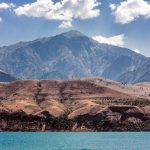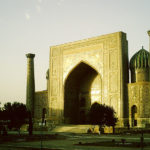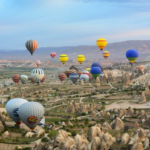A gay Uzbekistan man, Maxim Tumanev, talks about life in Uzbekistan (and America).
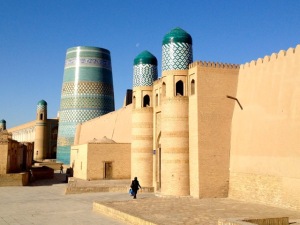
In an unfamiliar foreign country it’s whom you know that make’s a big difference in finding the right places and the right people.
In Uzbekistan, it makes all the difference. Despite internet searches and personal inquiries I could not find a single gay person to interview before or during my trip to that country famous for the historic Silk Road cities of Tashkent (the capital), Samarkand, Bukhara and Khiva.
It was not until I arrived in the country and, desperate for a LGBT contact, asked my non-gay (but gay friendly, it turned out) knowledgeable tour agent, Evgeny, for any name that could offer a lead.
Fortunately he knew a woman whose husband worked in the famous Ilkhom Theatre in Tashkent who provided a name and a place to meet, an articulate husband (American) and charming wife (Uzbek), for dinner one evening at our hotel Grand Plaza in the city. A pleasant event ensued with much personal story-telling about their lives, a romance that spanned from Uzbekistan to Seattle WA and back again.
Public Life
The gay name that came up during our chat was Maxim Tumanev. “You must talk to Maxim; he’s openly gay and everyone knows it.” Finally, I thought, I had my man, but then, “he moved to New York a couple of years ago” said the husband. Man lost–but connected through an e-mail address, by which we exchanged preliminary contact. Maxim was very welcoming.
Four months later I was in a cozy little restaurant in Greenwich Village in NYC talking to Mr. “everyone knows he’s gay” Maxim Tumanov in person. He is a cheerful, bright energetic man of 36 who moved to the US three years ago with a visa category of “alien with extraordinary ability”; the visa process took two years. His position with the Ilkhom Theatre in Uzbekistan established him in the ‘extraordinary’ profession of arranging international artistic exchanges.
Private Life
The other half of his life is less visible, more private and personal– and devoid of the protective shields of apprehension and paranoia necessary for gay survival in UZB. Like countless other young men he is on the lookout for Mr. Right, not Mr. Right-away. As an eligible bachelor, he is still finding his way around the infinite world of gay New York.
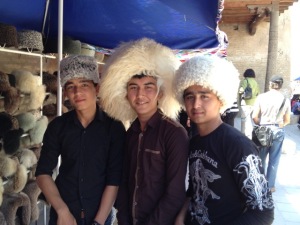 Coming from the bleak, secretive, illegal world of gay Uzbekistan where LGBT people are far back in their closets to the kaleidoscopic LGBT Big Apple scene is like emerging from a dim tunnel into vast acres of wildflowers in the sun. (The day after we spoke NYC celebrated its Gay Pride Parade 4 hours long with at least a million spectators.)
Coming from the bleak, secretive, illegal world of gay Uzbekistan where LGBT people are far back in their closets to the kaleidoscopic LGBT Big Apple scene is like emerging from a dim tunnel into vast acres of wildflowers in the sun. (The day after we spoke NYC celebrated its Gay Pride Parade 4 hours long with at least a million spectators.)
Maxim realized he was different in grade school and as usual did not understand his feelings toward men. In his teen years there were flirtations but nothing serious or sexual. Uzbekistan is a Muslim country with strong prohibitions against homosexuality; it is illegal and highly discriminated against.
(photo left: local Uzbek men try on traditional hats)
In a previous Uzbek story I reported a young woman telling me that her father would murder his son if he knew he was gay. That kind of attitude permeates the mostly Islamic culture there so Maxim learned very early to keep secrets about himself. In high school he was of course not the only gay youth so there were occasional tricks performed behind closed doors followed by fear. Gay passion was infused with apprehension and love mixed with shame.
In his twenties he met Eugene at the Ilkhom theatre whom he loved “too much,” Maxim said reflecting back on the six years they were more or less together. “My problem is that I fall in love with everyone I like,” he laughed as he told the story of their early passion–Maxim’s first–that seemed to fade after the first year as Eugene, six years older, did not return the same feelings. Over the next years he became more ambivalent about his homosexuality–understandable in a culture that forbids and condemns same-sex behavior.
It may have been that Eugene sensed a bleak and troubled future with Max (or any man), always hiding, always making excuses, always pretending to be straight with straight people. Max said their relationship became “normal” with little of the original emotion left and with increasing friction that often emerges in unsatisfying relationships. They argued more, especially when Eugene started dating a woman for a while then switched back to men (other than Max).
In a fit of anger Max left to cry, comforted by a friend. “We were not friends after that but we worked in the same place and had to see each other almost every day. That was hard. but it taught me to be stronger. The next year Eugene was in an accident and died. I wanted to grieve but by then there was a different tone to my sad feelings. A friend had died, not a lover.”
(photo right: Richard and Michael in front of statue of 14th century national hero Tamerlane-Timor)
The ‘Scene’ in Tashkent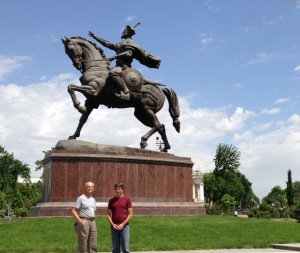
Single again, Max returned to the ‘scene’ in Tashkent which meant clubbing in straight places that were considered somewhat tolerant of gays, meaning as long as they blended into the crowd they weren’t thrown out if they seemed different, that is, wore fashionable clothes and danced well. Max wanted to dance but didn’t dare make a date in front of others so he turned to the main outlet for meeting other gays in UZB–online. It’s the most common place to meet other desiring men in the paranoid country. He had a few single dates until the ‘accident waiting to happen’ showed up.
He hooked up with a guy whom he brought home for the night. The next morning while Max showered the guy made a phone call and shortly thereafter the police arrived at his door. Threatened with arrest he had a choice, to go to jail (and get beaten up) or pay a ‘fine’ (a bribe to the police) or become a police informant to help bust other gays, as his overnight trick obviously was. “Pay up or bring us your friends they told me,” said Max. “I refused and it cost me $700 to get them out of my life.”
This is the feared trap that LGBT people live with in UZB. Deception, blackmail, bribes and threats in a police state that offers no protection against such corruption. A person is helpless against the authorities and the bigoted society that has been cemented in place for over 25 years under the fist of Islam Karimov, the president since independence from the Soviet Union in 1991.
Everyone lives in fear of the police who are everywhere, as I saw for myself during my three-week visit in 2014, at traffic intersections, pedestrian underpasses, at bridges and tunnels (with machine guns), in the big public food markets, even, one night, at the Ilkhom Theatre where an American theatre troupe from Seattle performed an original play about jazz and human rights called ‘The Seagull Project’. Without consulting the theatre manager a single policeman showed up outside the box office. He did not interfere or interrupt the performance. No one knows when or where they will appear, and they do appear as I saw one evening as I returned to my hotel. Outside the main entrance three policemen were questioning a hotel guest. I didn’t stop to ask who or why.
“Gay life in Tashkent is very quiet, ‘don’t ask don’t tell,'” said Maxim. “The scene is hidden behind polished closet doors of the well-to-do who have invitation-only parties or its in the privacy of the internet where most gays cruise without exposing themselves in public places. There used to be a handful of cruise parks toilets and pick-up spots but they are gone now; it’s too dangerous. But even there you can’t be sure, as I told you I found out the hard way.”
But guys cruise anyway. They figure the police can’t catch everyone, and they don’t so the majority of online cruisers usually get what they are looking for. It’s all very sad and unfair, the persecution and the fear. No one should live that way. But here are many people who see each other regularly and appear in public only as friends.
“
Fortunately homosexuality is socially invisible and there is a tradition of separation of genders here–although it’s not strict and you see a lot heterosexual couples in public. Men have a lot of freedom of their own and usually hang out with male friends so two guys together is not unusual–it also allows women to be with women at the same time since they are expected to be ‘good’ until marriage.
(photo left: Western Gate of Khiva walled city)
Gay Couples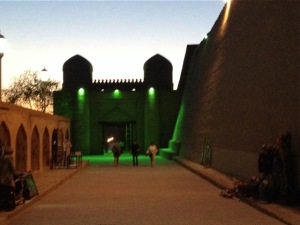
Max said he did not know any long-term gay couples at home. I told him of several couples who were friends of mine and my partner Michael who have been together for thirty or forty years. Max was amazed and pleased to hear this–unheard of role models in Uzbekistan. “Two couples I know have at most been together for ten years but they are not really together. They live in the same place but don’t have sex and are more like roommates. Another couple I know where the love is unequal and are into S/M. You can tell they are not happy with each other.”
Then he recalled another couple who have lived together for over ten years. Both men are interior designers and are popular with wealthy women. Yes, there is a privileged class of people in UZB who have prospered despite a repressive government. It’s not accurate to say–but not far from the truth–such people have insider connections with high-ranking officials who are happy to receive ‘gifts of friendship’ in exchange for contracts and advantageous positions in the controlled free market in UZB. But it is accurate to say there are more than a few. Oligarchs are alive and well in the country living in huge mansions and sporting BMWs.
Ethnic Differences
Ethnic affiliations also bring people together. There are many regional tribes in UZB but they are forced to appear as Uzbeks under the fearsome thumb of Karimov. Privately they prefer to socialize with their own types–Uzbeks, Russians, Tartars, Kazaka and others. Maxim said he is of Tartar descent, from his father, as well as Russian from his mother. When his parents divorced Maxim stayed with his father in Tashkent because he did not want to leave Tashkent at that time. He feels a divided ethnic affinity.
When he told his mother he was gay she was not surprised. She sensed it long before he came out to her. She was not upset but was concerned for his safety and health. “My father was not happy to hear about me and we did not speak much for a couple of years.”
These two reactions to a gay son reveal a modest but key difference between the Muslim Tartar and Orthodox Russian attitudes toward homosexuality. Although both cultures are homophobic, the Orthodox are Christian and less ‘lethal’ than the more conservative Muslim attitude. This was the observation of our Tashkent tour agent mentioned above.
That shift in perspective can make the difference between acceptance and rejection, inclusion or exclusion, life and death for LGBT offspring. This is not to suggest that Orthodox followers are in any way accepting of gays but as a branch of Christianity the scriptures ‘merely’ condemn homosexuality whereas the Muslim dogma is interpreted by modern leaders as a command for the death of gays. Maxim’s choice of which parent to follow was readily made. Today he is close and loving with his mother. His father is deceased.
As for Maxim now being an adoptive ‘gay American’ in New York City he finds the choices overwhelming. The change is like going from a placid dry desert to a rainy hurricane where life is in a tumble and choices become stumbling blocks. Too many men with too many egos to consider. The day after we met, he chose to go to the beach with a friend and be calm instead of attending the wild wonder of Gay Pride.

